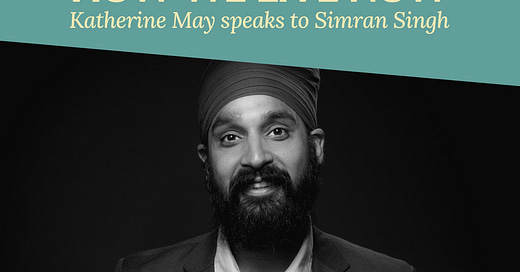Hello,
In between my fortnightly musings, I’ll be writing to let you know about new episodes of my podcast, How We Live Now.
This week, I talk to Simran Jeet Singh on Radical Interconnectedness.
Being a Sikh in America gives Simran a very particular insight into the divisions that run between us: on one hand, his visible differences have made him a target for racism; on the other, his religion emphasises the connectedness of all humans, and urges him towards compassion, forgiveness and love.
In this thoughtful and wide-ranging conversation, Katherine and Simran explore building empathy, seeing the divine in everyone, and how being forced to confront white supremacy has helped Simran to develop a language to challenge those who would attack him. The Sikh value of Chardi Kala is hard to miss here: the sense of everlasting optimism that propels him forward.
Links from the episode:
Simran's website
Simran's book, The Light We Give: How Sikh Wisdom Can Transform Your Life
How We Live Now is recorded using RiversideFM and hosted by Acast.
Join the conversation! We’re also inviting your thoughts on each episode from now on click here to join the conversation. Answers, challenges, ideas and further questions are all welcome - there will be a further episode in a couple of months focusing on your voices.
From the transcript
Simran Singh: Yeah, exactly. And I think that's where this point from Foucault comes up. You just practice it, you've live it. And then when push comes to shove, you're ready for those difficult moments. And sometimes they're not as easy as others. I struggled, even though I had years of practice. When this massacre happened, I really struggled to hold on my discipline. But I think part of what enabled me to get through that tough period was the years of practice that I had put in so that I could actually have a foundation to build on. So yeah, it is a really powerful teaching.
Katherine May: But that fascinates me because I think we're in a place at the moment where we seem to be governed by conflict and we're all kind of afraid of that conflict. It's not that anyone seems to be enjoying the culture war as it gets called. And in fact, a big part of it is seems that we're afraid of the, I don't know, criticism of our way of life that might come from our perceived kind of opposite side or that we're afraid of being hurt or harmed by the words that we might encounter. But what you are saying is that you had no choice but to encounter the harm and it made it gave you a technology almost by which you could handle it before and reduce conflict into the future.
Simran Singh: Yeah, I mean, I think that's right. And as people ask me, I mean, this has happened since I was a child. As people ask me, "Why do you wear a turban?" For most of my life, it never occurred to me to say that it's an external article of clothing that I wear on top of my head. What sense would it make to someone if I said, "Well, it helps form me on the inside." We don't think that way. And I never really thought that way. But there's also a teaching and a memory within Sikh tradition that our founders and leaders are called gurus. And as the ninth one was being executed, as he stood up to state oppression, the Sikh community, his followers, the tradition goes, did not stand up for him in that moment and did not step up in this time of need by their principles.
Note: this email includes affiliate links which means I will receive a small commission for any purchases made
Website | Patreon | Retreat | Preorder: Enchantment UK /US | Buy: Wintering UK / US | Buy: The Electricity of Every Living Thing UK / US






I'm a huge admirer of your book 'Wintering'. As a Sikh myself, it was surprising and delightful to see this post. Very much enjoyed this episode, thank you!
this is so interesting and very timely - I write about the challenges of articulating the toxicity of whiteness and what you call 'radical interconnectedness' so I loved listening to this. Thank you so much!